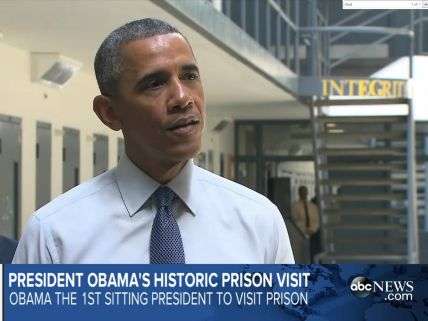On Commutations, DOJ Blames Volunteer Lawyers for Failing to Do Its Job
A big backlog of prisoners seeking shorter sentences has gotten a lot bigger.

At the beginning of 2014, when the Justice Department asked private attorneys for help in locating worthy candidates for commutation, it was already sitting on thousands of applications from federal prisoners seeking shorter sentences. Two years later, Reuters reports, about 9,000 petitions are pending at the DOJ, and another 9,000 still need to be reviewed by the network of lawyers who volunteered to help vet applicants. So far the organization, known as Clemency Project 2014, has been contacted by 34,000 prisoners and has forwarded petitions from only 300 or so, 31 of whom have received commutations.
While the raw number of commutations granted by Obama, 187, looks impressive, it represents less than 1 percent of the petitions he has received, compared to almost 7 percent for Richard Nixon, 4 percent for Gerald Ford, and almost 3 percent for Jimmy Carter. Measured by this rate, clemency expert P.S. Ruckman Jr. observes, Obama looks about as good as Ronald Reagan and Bill Clinton, although better than either of the Bushes.
What happened? In 2014 Obama administration officials were envisioning "thousands" of commutations by the end of the president's second term. After a very slow start in his first term, when he shortened just one sentence, Obama did pick up the pace, but not nearly enough to hit that target.
The DOJ is blaming the Clemency Project: "A senior DOJ official told Reuters it is calling on the lawyers' group…to simply hand over the outstanding cases without further vetting, saying it is not working fast enough." Yet Cynthia Roseberry, project manager at the lawyers' network, "said the group was unaware of any request from the Justice Department to hand over the pending applications."
One reason the Clemency Project has been moving so slowly is that it wanted to make sure the applicants it recommended met the DOJ's excessively picky criteria, which require ascertaining whether a prisoner would have received a shorter sentence under current law, whether he has "a significant criminal history," whether he has "demonstrated good conduct in prison," and whether he has "significant ties to large-scale criminal organizations, gangs or cartels." Applicants are also supposed to be low-level, nonviolent offenders who have served at least 10 years.
"There are a lot of gray areas," Roseberry told Reuters. "We've got to unpack each of these applicants to see specifically what factors affect them…and so that takes a little more time." On average, she estimates, each case takes about a month for a lawyer to review. The project has rejected some 25,000 applicants for failing to meet the DOJ criteria.
Not only did the DOJ make the task of vetting applicants unnecessarily difficult; it is now blaming volunteers for failing to do its job. "It's unfair to criticize the volunteer group that you asked to help," observes NYU law professor Rachel Barkow. The Justice Department's Office of the Pardon Attorney had a big backlog long before the Clemency Project existed, and now it has an even bigger backlog. The fundamental problem is not that volunteer lawyers are moving too slowly but that the DOJ has abdicated its responsibility to review clemency petitions.


Show Comments (22)